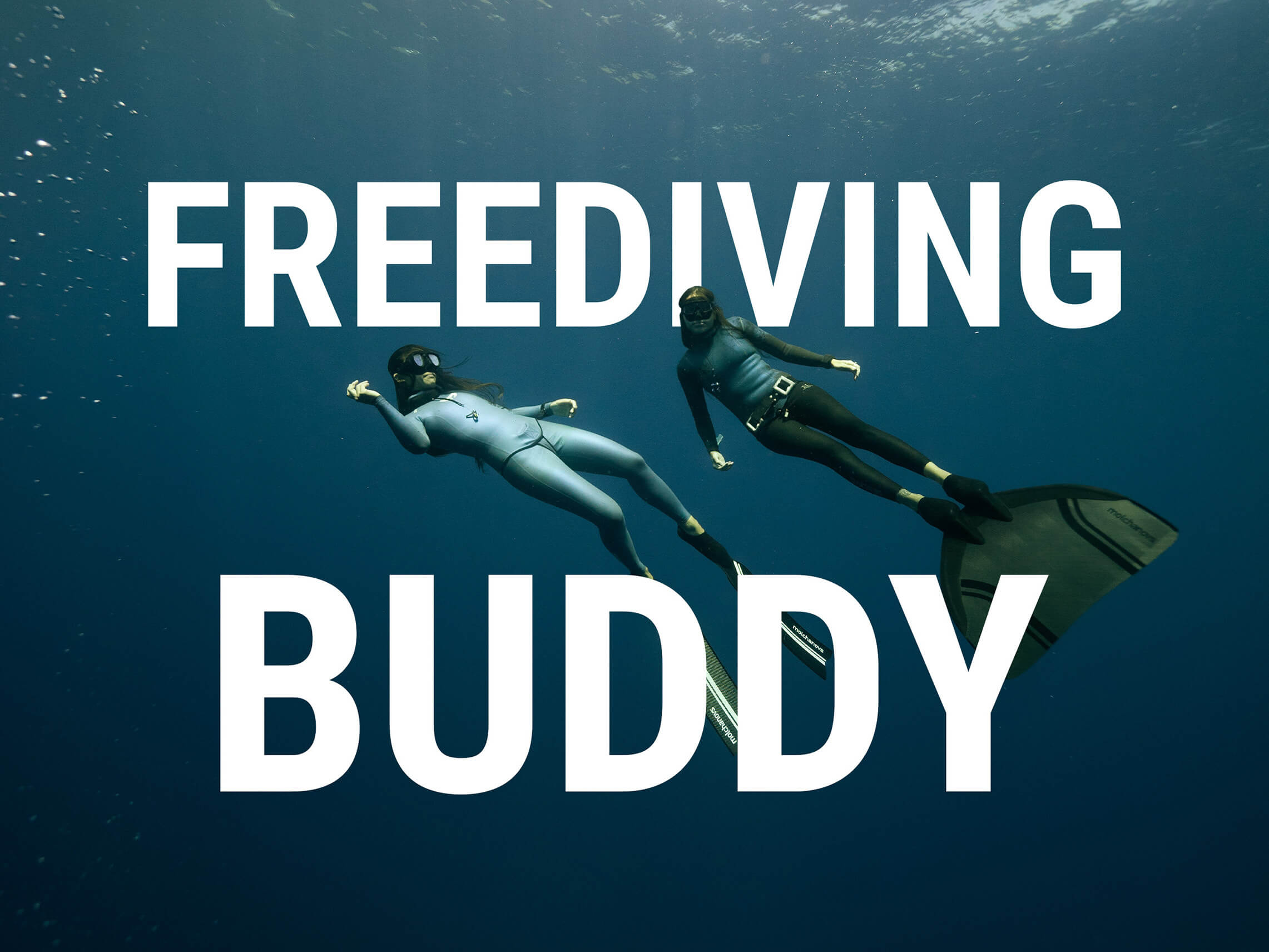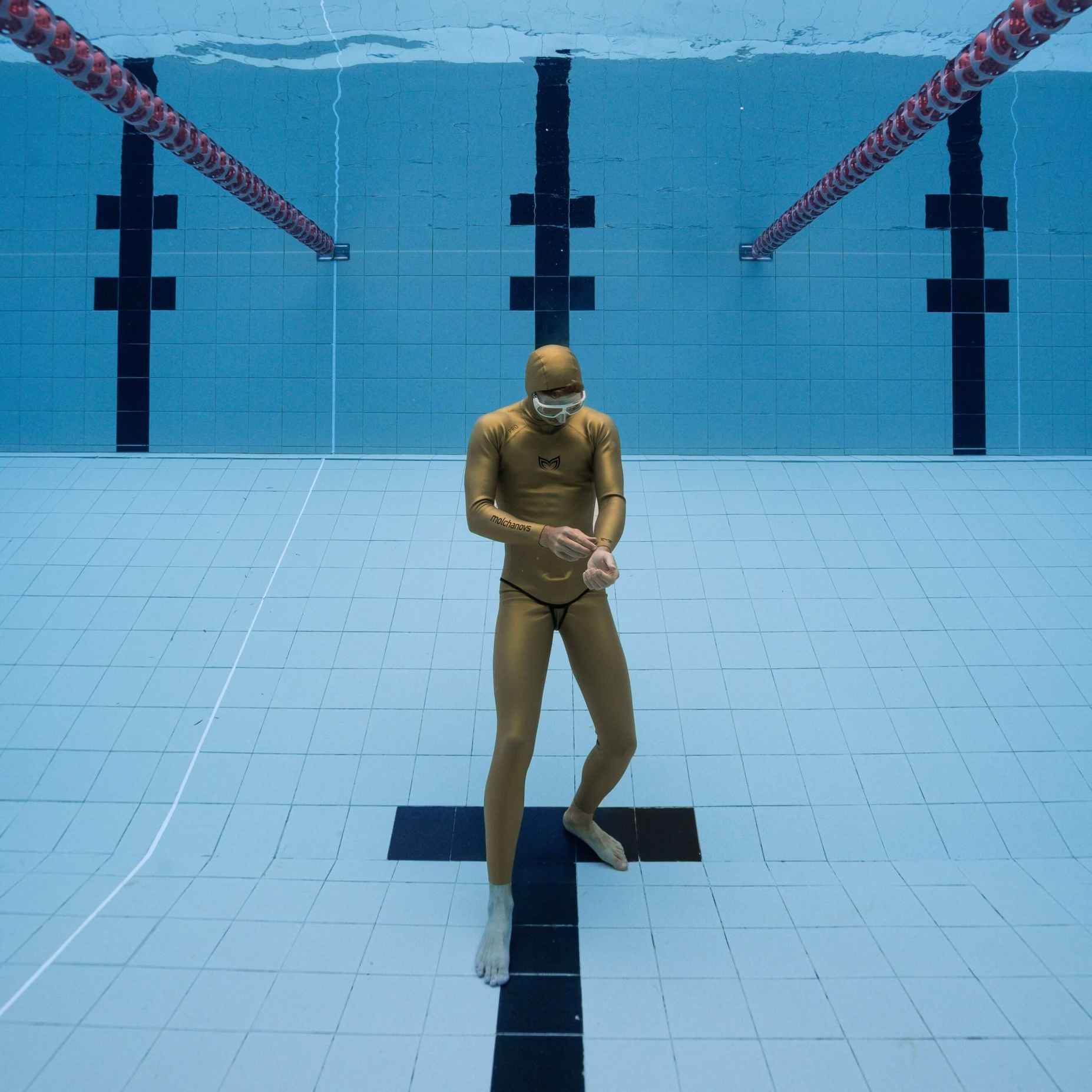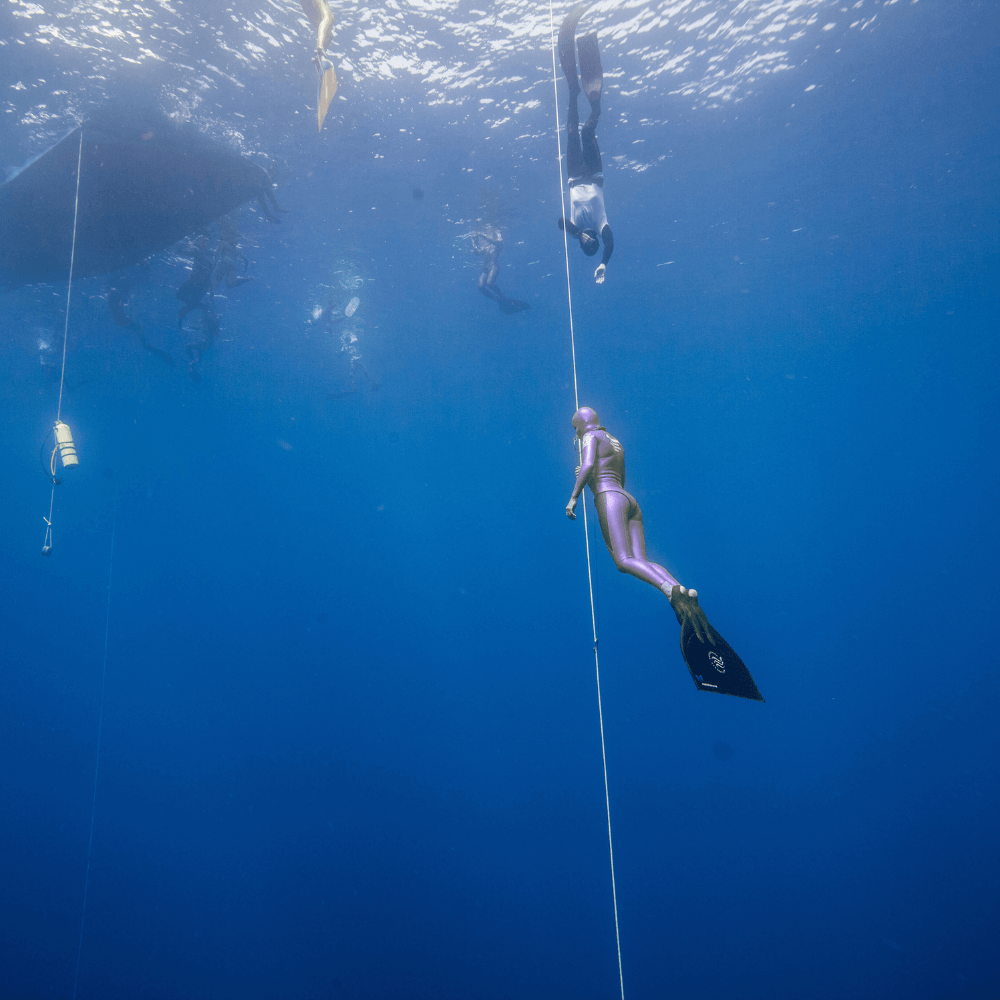5 Things You Absolutely Need from a Freediving Buddy

By Kristina Zvaritch
Freediving is a fun and joyful activity, but it must also be taken very seriously from a safety standpoint.
You have probably heard by now that the number one rule in freediving is to never freedive alone. But there’s something important we need to emphasize here:
Freediving with an untrained buddy is the SAME as freediving alone.
That means if you are practicing any of the following freediving activities, you must have a trained buddy monitoring you and ready to rescue if necessary:
Let’s take a look at the five things that are absolutely necessary in a potential freediving buddy.

Answer: Only if they have had previous freediving training and certification to show for it!
When we mean proper freediving training, we mean someone who took a freediving course from a reputable agency (Molchanovs, AIDA, PADI, SSI, etc.). Their course should have a certification level - for example, a Molchanovs Discover Freediving Wave Experience or an AIDA 1 course do not count - these are only introductory courses.
A proper freediving certification has performance requirements and includes freediving safety and rescue techniques - not only the theory but also practicing actual rescue scenarios. This certification says, “I’ve taken a course, passed an exam on my freediving theory and safety knowledge, performed and passed the physical requirements of a certain freediving level, and have the trust of my freediving instructor to attach their name to mine as my instructor.”
Remember that scuba divers at depth cannot be responsible for assisting or rescuing you - they have their own safety to worry about and cannot ascend to the surface quickly to help you in an emergency. And even if they did, they wouldn’t know how to help an unconscious freediver unless they’ve taken a freediving course.
Similarly, if you are going fun diving or training in open water for the first time, it’s a must to go with someone who is very aware of the sea conditions, currents, boat traffic, entry/exit points, etc. If you don’t have someone like that, don’t be shy - head to the nearest freediving school and book a line training or fun diving session. The school will pair you with an instructor or dive guide familiar with the area, will act as your safety, and can point out all the must-see things!
If there’s no freediving school, check for a Molchanovs instructor near you in the area or log on to Facebook and find local freediving/spearfishing groups. They can advise you on the conditions and maybe even become a new freediving buddy!
And remember, it’s always a good idea to be CPR/First Aid certified. Don’t wait until you are required to take it in your Molchanovs Lap/Wave 3 course. This knowledge is helpful in and out of the water and will make you a valuable freediving buddy!

The session plan before the dive:

A responsible freediving buddy would never jeopardize your safety or health by performing risky dives. It’s an even better idea to continuously practice rescue scenarios and talk over possible emergency scenarios with new freediving buddies to reinforce that feeling of reliability!
Look for buddies with similar experience, goals, and diving preferences that match your own. This will make training sessions more productive and enjoyable (with safety as the main objective, of course)!

Check out these other important qualities to look for in a training partner:
General health and physical fitness: Freediving is physically demanding, especially with all that safetying! Look for someone in good general health, capable of towing and handling an unconscious person in an emergency, and has no problem handling heavy freediving equipment.
Knows the dive site: Someone who knows the conditions of the dive site, which mooring lines to use, boat traffic in the area, and where exactly emergency services will only be an asset to you and your diving!
Discipline familiarity: If you’re exploring the monofin or want to train DNF/CNF, a buddy with a background in the discipline and equipment required can give you helpful tips on technique and style.
Staying calm under pressure: Unexpected things will always arise, no matter how well you prepare. A freediving buddy who stays cool in high-pressure situations will be able to breathe, think, and act rather than panic.
Teamwork skills: Sometimes we dive in threes or fours, which means more safety opportunities! To coordinate multiple safeties, teamwork and communication are required. A freediving buddy with teamwork skills can easily take on any role and become a helping hand.
Adaptability: Things can change quickly during a freediving session - a change in current, a calm sea turning choppy, getting disconnected from a mooring line, etc. An adaptable buddy can adjust to unexpected circumstances and take extra action if necessary.
Respects limits: A good freediving buddy respects limits - not only theirs but yours as well. They would never ask you to do safety deeper than you are comfortable with or push themselves (or you) for performances that are not yet within reach.
Continued learning: Freediving is a sport with theory and science that continues to evolve, and freedivers must evolve with it! Even after a course, a good freediving buddy should have a healthy curiosity and thirst for knowledge and be willing to share that knowledge with you (and vice versa).

Additionally, ask yourself every once in a while, “Am I a good freediving buddy?” We can’t forget that we must also possess all the qualities listed above and continuously work on bettering ourselves as freedivers.
If you have not yet taken a certified beginner-level freediving course or want to upgrade your skills and safety with an upper-level course, take the leap and check for a Molchanovs instructor near you.
If you’re looking for a dry training program to do by yourself or a pool/open water training program to do with your freediving buddy, check out Molchanovs Base Training. Base Training is a collection of training programs for four different levels of freedivers (beginner level all the way up to competitive level), all of which are designed to help you further your freediving skills!
We all want to come home to our loved ones at the end of the day, and a good freediving buddy will do everything to make sure you do.
Freediving is a fun and joyful activity, but it must also be taken very seriously from a safety standpoint.
You have probably heard by now that the number one rule in freediving is to never freedive alone. But there’s something important we need to emphasize here:
Freediving with an untrained buddy is the SAME as freediving alone.
That means if you are practicing any of the following freediving activities, you must have a trained buddy monitoring you and ready to rescue if necessary:
- Static (STA) - Breath-holding face-down on the water’s surface
- Dynamic with Bifins (DYNB) - Swimming for distance on a breath-hold using bifins
- Dynamic with Fins (DYN) - Swimming for distance on a breath-hold using bifins or a monofin
- Dynamic with No Fins (DNF) - Swimming for distance on a breath-hold using arm and leg strokes
- Free Immersion (FIM) - Pulling down and up a dive line on a breath-hold
- Constant Weight with Bifins (CWTB) - Swimming down and up a dive line on a breath-hold using bifins
- Constant Weight (CWT) - Swimming down and up a dive line on a breath-hold using bifins or a monofin
- Constant Weight No Fins (CNF) - Swimming down and up a dive line on a breath-hold using only arm or leg strokes
- Fun diving - Diving down on a breath-hold in open water (pool, ocean, lake, sea, etc.)
Let’s take a look at the five things that are absolutely necessary in a potential freediving buddy.

Training and Certification
Question: Can your parent/partner/pool lifeguards or staff be potential buddies?Answer: Only if they have had previous freediving training and certification to show for it!
When we mean proper freediving training, we mean someone who took a freediving course from a reputable agency (Molchanovs, AIDA, PADI, SSI, etc.). Their course should have a certification level - for example, a Molchanovs Discover Freediving Wave Experience or an AIDA 1 course do not count - these are only introductory courses.
A proper freediving certification has performance requirements and includes freediving safety and rescue techniques - not only the theory but also practicing actual rescue scenarios. This certification says, “I’ve taken a course, passed an exam on my freediving theory and safety knowledge, performed and passed the physical requirements of a certain freediving level, and have the trust of my freediving instructor to attach their name to mine as my instructor.”
Remember that scuba divers at depth cannot be responsible for assisting or rescuing you - they have their own safety to worry about and cannot ascend to the surface quickly to help you in an emergency. And even if they did, they wouldn’t know how to help an unconscious freediver unless they’ve taken a freediving course.
Experience
Yes, everyone has to start somewhere - but unless you already have a lot of experience under your weight belt, it’s always a good idea to try to find someone who has more experience than you when you first start going out line training.Similarly, if you are going fun diving or training in open water for the first time, it’s a must to go with someone who is very aware of the sea conditions, currents, boat traffic, entry/exit points, etc. If you don’t have someone like that, don’t be shy - head to the nearest freediving school and book a line training or fun diving session. The school will pair you with an instructor or dive guide familiar with the area, will act as your safety, and can point out all the must-see things!
If there’s no freediving school, check for a Molchanovs instructor near you in the area or log on to Facebook and find local freediving/spearfishing groups. They can advise you on the conditions and maybe even become a new freediving buddy!
And remember, it’s always a good idea to be CPR/First Aid certified. Don’t wait until you are required to take it in your Molchanovs Lap/Wave 3 course. This knowledge is helpful in and out of the water and will make you a valuable freediving buddy!

Communication Skills
While having good communication skills is useful for life above water, it’s definitely a must-have for freediving! You and your buddy will be discussing everything before, during, and after your dive session. A good freediving buddy should tell you:The session plan before the dive:
- Their goals/objectives for their session
- What disciplines they are training and their previous PBs in those disciplines
- What dives and how many they want to do
- How deep they want to go
- Any verbal or non-verbal communication you may use and what it means (especially when training STA)
- How deep they will go on each dive and their dive time
- How deep you should meet them (always a minimum of 10m/33ft)
- How they felt about the dive they just did
- How long of a surface interval they need before you perform your dive
- Point out any issues you have after a dive (for example, if you surfaced with dark lips or look shaky during your recovery breathing)
- General discussion about the session
- Any helpful or positive input

Reliability and Trustworthiness
Having a reliable and trustworthy freediving buddy is crucial - after all, you’re engaging in a sport where safety is the absolute number one priority! This will not only be convenient for you (no one wants a buddy who always cancels last minute or is late to safety you on a dive), it will also allow you to fully relax on your dives knowing you’re in good hands.A responsible freediving buddy would never jeopardize your safety or health by performing risky dives. It’s an even better idea to continuously practice rescue scenarios and talk over possible emergency scenarios with new freediving buddies to reinforce that feeling of reliability!
Compatibility
Honestly, you may not fully enjoy training with every person you dive with, but that’s okay! For example, you may be someone who wants to dive in a relaxed manner and chat during surface intervals, while the person you’re training with wants to cut the small talk and do as many dives as they can. That’s why it’s essential to find a buddy that you’re compatible with.Look for buddies with similar experience, goals, and diving preferences that match your own. This will make training sessions more productive and enjoyable (with safety as the main objective, of course)!

Other Attributes
We already went over the top 5 things you absolutely need from your freediving buddy, but it’s not over just yet!Check out these other important qualities to look for in a training partner:
General health and physical fitness: Freediving is physically demanding, especially with all that safetying! Look for someone in good general health, capable of towing and handling an unconscious person in an emergency, and has no problem handling heavy freediving equipment.
Knows the dive site: Someone who knows the conditions of the dive site, which mooring lines to use, boat traffic in the area, and where exactly emergency services will only be an asset to you and your diving!
Discipline familiarity: If you’re exploring the monofin or want to train DNF/CNF, a buddy with a background in the discipline and equipment required can give you helpful tips on technique and style.
Staying calm under pressure: Unexpected things will always arise, no matter how well you prepare. A freediving buddy who stays cool in high-pressure situations will be able to breathe, think, and act rather than panic.
Teamwork skills: Sometimes we dive in threes or fours, which means more safety opportunities! To coordinate multiple safeties, teamwork and communication are required. A freediving buddy with teamwork skills can easily take on any role and become a helping hand.
Adaptability: Things can change quickly during a freediving session - a change in current, a calm sea turning choppy, getting disconnected from a mooring line, etc. An adaptable buddy can adjust to unexpected circumstances and take extra action if necessary.
Respects limits: A good freediving buddy respects limits - not only theirs but yours as well. They would never ask you to do safety deeper than you are comfortable with or push themselves (or you) for performances that are not yet within reach.
Continued learning: Freediving is a sport with theory and science that continues to evolve, and freedivers must evolve with it! Even after a course, a good freediving buddy should have a healthy curiosity and thirst for knowledge and be willing to share that knowledge with you (and vice versa).

Final Thoughts
Freediving is a safe sport, but only if it’s practiced correctly. And as capable as we may think we are, the buddy system exists for a reason. If you think you know your limits or are ‘just doing easy dives,’ remember that even freediving record holders who weren’t doing challenging dives have lost their lives, both in the sea and pools.Additionally, ask yourself every once in a while, “Am I a good freediving buddy?” We can’t forget that we must also possess all the qualities listed above and continuously work on bettering ourselves as freedivers.
If you have not yet taken a certified beginner-level freediving course or want to upgrade your skills and safety with an upper-level course, take the leap and check for a Molchanovs instructor near you.
If you’re looking for a dry training program to do by yourself or a pool/open water training program to do with your freediving buddy, check out Molchanovs Base Training. Base Training is a collection of training programs for four different levels of freedivers (beginner level all the way up to competitive level), all of which are designed to help you further your freediving skills!
We all want to come home to our loved ones at the end of the day, and a good freediving buddy will do everything to make sure you do.




Really good to see this information @ 76yrs got my padi certificate 50 years ago it’s a great reminder we need to upgrade our skills. Thanks for this valuable information. I will definitely be looking for an course to upskill
Leave a comment